初中八年级英语上册外研版Module 11 Way of life 测试卷 (2)
- 格式:doc
- 大小:31.62 KB
- 文档页数:8
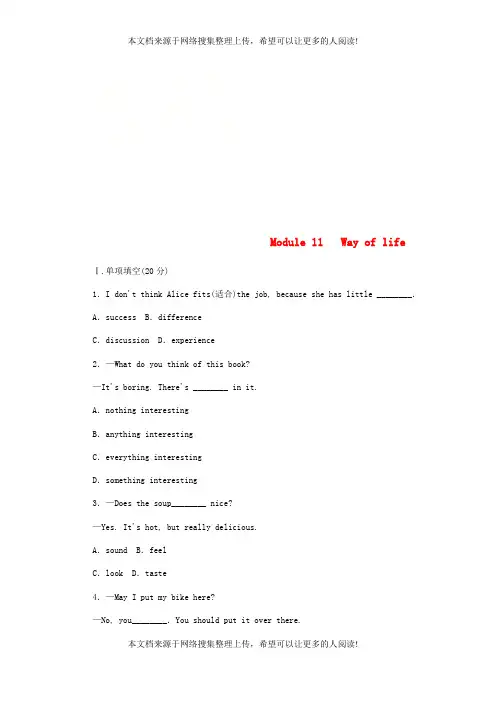
Module 11 Way of life Ⅰ.单项填空(20分)1.I don't think Alice fits(适合)the job, because she has little ________.A.success B.differenceC.discussion D.experience2.—What do you think of this book?—It's boring. There's ________ in it.A.nothing interestingB.anything interestingC.everything interestingD.something interesting3.—Does the soup________ nice?—Yes. It's hot, but really delicious.A.sound B.feelC.look D.taste4.—May I put my bike here?—No, you________.You should put it over there.A.couldn't B.needn'tC.mustn't D.won't5.—Does he need ________ there at once?—No, he ________ leave so hurriedly because he has enough time.A.to go; doesn't needB.go; needn'tC.to go; needn'tD.go; doesn't need6. Be quick! The game will begin ________.A. immediatelyB. recentlyC. carefullyD. luckily7.You'd better ________ late for school again.A.not to be B.not beC.won't be D.don't be8.What ________ news it is! Nobody ________ it.A.a surprising; believesB.surprising; believesC.a surprised; believeD.surprised; believe9.—Has Lucy ________ my invitation?—Yes, she has. But she can't ________ it because she will have to look after her grandpa that day.A.received; receive B.accepted; acceptC.received; accept D.accepted; receive10.—It's said that there will be a storm tomorrow.—________. I planned to go climbing with my classmates.A.I hope so B.I'm afraid soC.Sounds good D.Bad luckⅡ.完形填空(20分)Manners are important to keep good relations (关系) among people. __11__ likes a person with bad manners. A person with __12__ manners never __13__ people when they are __14__ trouble. Instead, he tries to help them. When he asks for something, he says “Please”. And when he __15__ others' help, he usually says “Thank you”. He does not interrupt(打扰) others when they are talking. He does not __16__ loudly in public. When he __17__, he uses a handkerchief(手绢). __18__ a student, it is bad manners to come late for class. __19__ you are late, you should say __20__ to the teacher.11.A.Some one B.No one C.Any one D.One12.A.sad B.certain C.bad D.good13.A.smiles at B.laughs at C.looks at D.says to14.A.on B.from C.in D.as15.A.takes B.looks C.sees D.gets16.A.talk B.tell C.jump D.think17.A.sneezes B.smokes C.drinks D.eats18.A.And B.So C.With D.For19.A.Because B.If C.Although D.Then20.A.sorry B.thank you C.OK D.not at allⅢ.阅读理解(15分)Different countries have different customs in giving presents.IN CHINA you must never give a clock to a Chinese person, because the sound of the word for “clock” is similar to the sound for “death” in Chinese. Also, don't wrap(包裹) a present in white, black, or blue paper, because these are the colours for funerals(葬礼). Don't give a knife, because something sharp(锋的) can cut a friendship.IN RUSSIA if we give flowers as a present, we have to give odd numbers of them (one, three, five, etc.) because even numbers of flowers (two, four, six, etc.) are for funerals.IN GERMANY flowers are a good present to take to your dinner hostess, but don't take her red roses because it means you are in love with her. Don't take thirteen of anything because it's an unlucky number. Don't take an even number of anything, either. Don't wrap your present in white, brown, or black paper.21.Why can't we give a clock as a present to a Chinese? Because in Chinese ________.A.the word “clock” h as the same meaning with the word “death”B.the word “clock” has the same sound with the word “death”C.the word “clock” has the same meaning with the word “knife”D.the word “clock” means “dangerous”22.You may take ________ if you go to a birthday party in Russia or in Germany.A.10 flowers B.13 flowersC.9 flowers D.11 red roses23.________ thirteen is an unlucky number.A.In China B.In RussiaC.In Japan D.In Germany24.What's the Chinese meanings for “odd number” and “even number”?A.自然数和偶数B.基本数和奇数C.奇数和偶数D.幸运数字和不幸运数字25.Which of the following is TRUE?A.Neither Chinese nor Germans wrap presents in black or white paper.B.Both Chinese and Russians wrap presents in black or white paper.C.Both Chinese and Germans wrap presents in black or white paper.D.Neither Chinese nor Russians wrap presents in black or yellow paper.Ⅳ.补全对话(10分)(Vicky and Zheng Na are chatting by QQ.)V: This summer holiday my family will go to Beijing for a trip.Z: That sounds great!V: 26.________Z: No. It's different from your country. People should drive on the right.V: Do people always shake hands when they meet?Z: No. When you meet someone for the first time, you should shake hands.27.________V: OK. And what do people use for meals?Z: Chopsticks.V: 28.________Z: No, you needn't eat up the food on the plate.V: 29.________Z: The host often makes tea for the guests.V: I see. 30.________Z: You're welcome.Ⅴ. 根据汉语意思完成句子(10分)31.我们应该更多地关注传统文化。
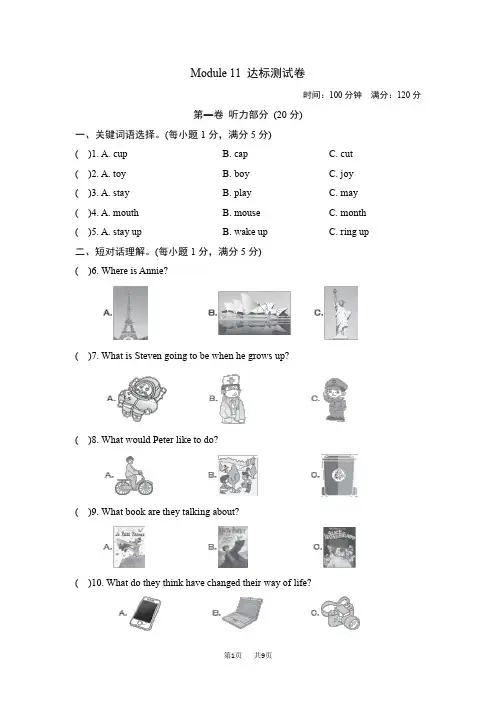
Module 11 达标测试卷时间:100分钟满分:120分第一卷听力部分(20分)一、关键词语选择。
(每小题1分,满分5分)()1. A. cup B. cap C. cut()2. A. toy B. boy C. joy()3. A. stay B. play C. may()4. A. mouth B. mouse C. month()5. A. stay up B. wake up C. ring up二、短对话理解。
(每小题1分,满分5分)()6. Where is Annie?()7. What is Steven going to be when he grows up?()8. What would Peter like to do?()9. What book are they talking about?()10. What do they think have changed their way of life?三、长对话理解。
(每小题1分,满分5分)听第一段对话,回答11~12小题。
()11. Where are the speakers now?A. In America.B. In Canada.C. In England. ()12. When is Thanksgiving Day in America?A. On the fourth Thursday in November.B. On the fourth Thursday in December.C. On the third Wednesday in November.听第二段对话,回答13~15小题。
()13. When is Ann going to New York?A. Next Monday.B. Next Tuesday.C. Next Friday. ()14. Why is Ann going to New York?A. To learn English.B. To visit friends.C. To spend holiday.()15. What can we learn from the dialogue?A. Ann will buy a watch for Kevin.B. The weather may be cold in New York.C. Seeing a doctor is not expensive in America.四、信息转换。
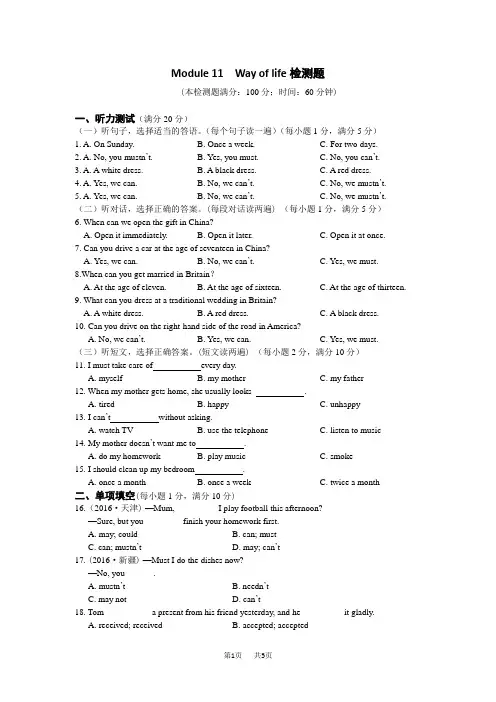
Module 11 Way of life检测题(本检测题满分:100分;时间:60分钟)一、听力测试(满分20分)(一)听句子,选择适当的答语。
(每个句子读一遍)(每小题1分,满分5分)1. A. On Sunday. B. Once a week. C. For two days.2. A. No, you mustn’t. B. Yes, you must. C. No, you can’t.3. A. A white dress. B. A black dress. C. A red dress.4. A. Yes, we can. B. No, we can’t. C. No, we mustn’t.5. A. Yes, we can. B. No, we can’t. C. No, we mustn’t. (二)听对话,选择正确的答案。
(每段对话读两遍)(每小题1分,满分5分)6. When can we open the gift in China?A. Open it immediately.B. Open it later.C. Open it at once.7. Can you drive a car at the age of seventeen in China?A. Yes, we can.B. No, we can’t.C. Yes, we must.8.When can you get married in Britain?A. At the age of eleven.B. At the age of sixteen.C. At the age of thirteen.9. What can you dress at a traditional wedding in Britain?A. A white dress.B. A red dress.C. A black dress.10. Can you drive on the right-hand side of the road in America?A. No, we can’t.B. Yes, we can.C. Yes, we must.(三)听短文,选择正确答案。
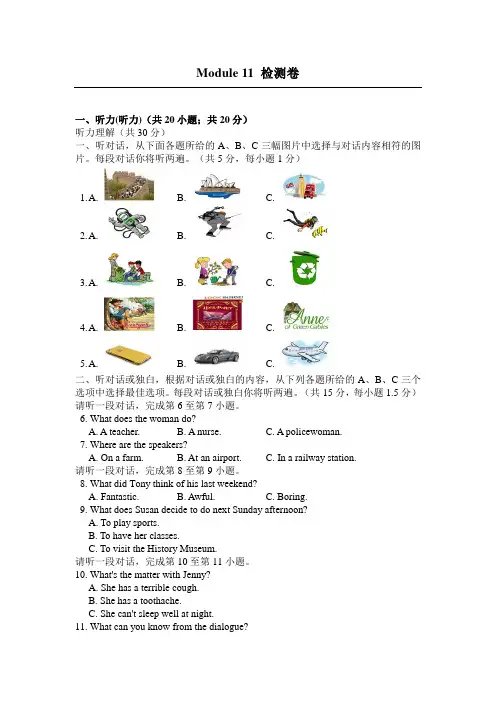
Module 11 检测卷一、听力(听力)(共20小题;共20分)听力理解(共30分)一、听对话,从下面各题所给的A、B、C三幅图片中选择与对话内容相符的图片。
每段对话你将听两遍。
(共5分,每小题1分)1. A. B. C.2. A. B. C.3. A. B. C.4. A. B. C.5. A. B. C.二、听对话或独白,根据对话或独白的内容,从下列各题所给的A、B、C三个选项中选择最佳选项。
每段对话或独白你将听两遍。
(共15分,每小题1.5分)请听一段对话,完成第6至第7小题。
6. What does the woman do?A. A teacher.B. A nurse.C. A policewoman.7. Where are the speakers?A. On a farm.B. At an airport.C. In a railway station.请听一段对话,完成第8至第9小题。
8. What did Tony think of his last weekend?A. Fantastic.B. Awful.C. Boring.9. What does Susan decide to do next Sunday afternoon?A. To play sports.B. To have her classes.C. To visit the History Museum.请听一段对话,完成第10至第11小题。
10. What's the matter with Jenny?A. She has a terrible cough.B. She has a toothache.C. She can't sleep well at night.11. What can you know from the dialogue?A. Jenny has been ill for about three weeks.B. They didn't agree to plant trees together.C. Frank's home is far away from his school.请听一段对话,完成第12至第13小题。
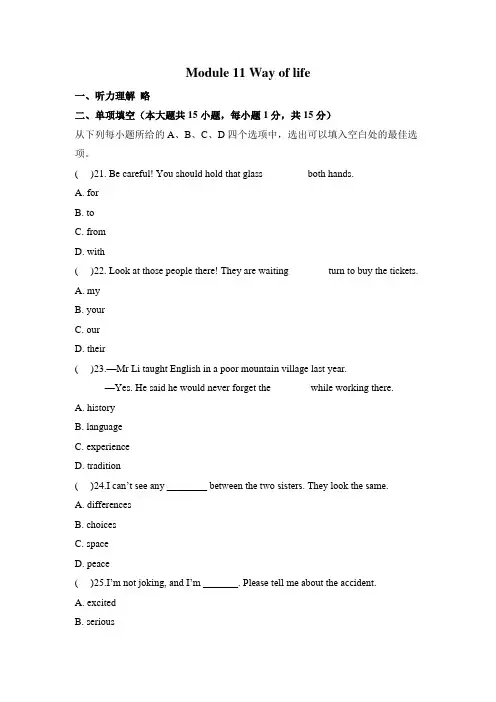
Module 11 Way of life一、听力理解略二、单项填空(本大题共15小题,每小题1分,共15分)从下列每小题所给的A、B、C、D四个选项中,选出可以填入空白处的最佳选项。
( )21. Be careful! You should hold that glass ________ both hands.A. forB. toC. fromD. with( )22. Look at those people there! They are waiting _______ turn to buy the tickets.A. myB. yourC. ourD. their( )23.—Mr Li taught English in a poor mountain village last year.—Yes. He said he would never forget the _______ while working there.A. historyB. languageC. experienceD. tradition( )24.I can’t see any ________ between the two sisters. They look the same.A. differencesB. choicesC. spaceD. peace( )25.I’m not joking, and I’m _______. Please tell me about the accident.A. excitedB. seriousC. funnyD. free( )26.The workers started to work _______ after having a short break.A. probablyB. especiallyC. immediatelyD. certainly( )27.May I have more biscuits, please? They ________ great.A. lookB. tasteC. soundD. smell( )28.—I forgot to bring my dictionary. Could I use yours?—Yes, you _______.A. canB. mustC. needD. should( )29.—________ you leave now? You only arrived here an hour ago.—Sorry, but so much homework is waiting for me.A. MayB. MustC. CanD. Might( )30.—Do you want to eat here?—No. Just fish and chips to ________, please.A. get awayB. send awayC. throw awayD. take away( )31. Jenny is _______ you at the gate. Hurry up!A. waiting forB. thinking aboutC. writing toD. looking after( )32.You had better _________ alone at night. It’s not safe.A. go outB. not go outC. going outD. not going out( )33. I am interested ________ your ideas on the problem.A. hearB. hearingC. to hearD. heard( )34.—Must we take out the rubbish now?—________. You can do it after class.A. Yes, you mustB. No, you can’tC. Yes, you mayD. No, you needn’t( )35. ________! I thought you wouldn’t come.A. T hat’s too badB. It’s bad luckC. Hang on a minuteD. What a surprise三、完形填空(本大题共10小题,每小题1分,共10分)阅读下面短文,掌握其大意,然后从各题所给的A、B、C、D四个选项中选出最佳选项。
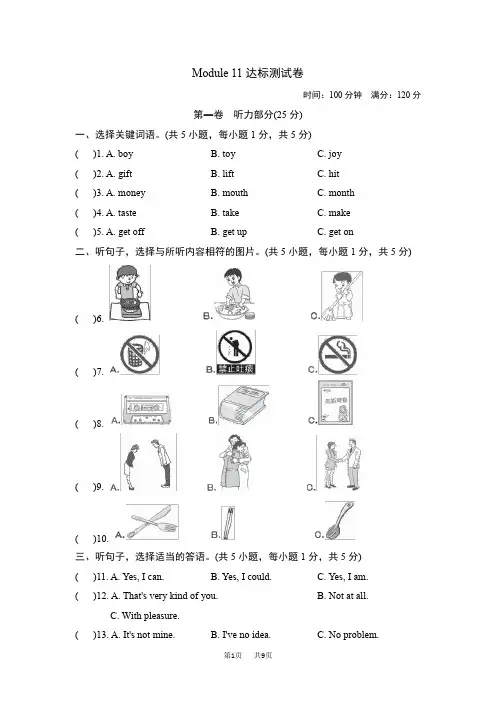
Module 11达标测试卷时间:100分钟满分:120分第一卷听力部分(25分)一、选择关键词语。
(共5小题,每小题1分,共5分)()1. A. boy B. toy C. joy()2. A. gift B. lift C. hit()3. A. money B. mouth C. month()4. A. taste B. take C. make()5. A. get off B. get up C. get on二、听句子,选择与所听内容相符的图片。
(共5小题,每小题1分,共5分) ()6.()7.()8.()9.()10.三、听句子,选择适当的答语。
(共5小题,每小题1分,共5分)()11. A. Yes, I can. B. Yes, I could. C. Yes, I am.()12. A. That's very kind of you. B. Not at all.C. With pleasure.()13. A. It's not mine. B. I've no idea. C. No problem.()14. A. Yes, I would. B. Yes, please. C. Yes, I'd love to. ()15. A. Children's Day. B. New Year's Day.C. Teachers' Day.四、听对话,选择正确的答案。
(共5小题,每小题1分,共5分)()16. When can we open the gift in China?A. Open it immediately.B. Open it later.C. Open it at once.()17. Can you drive a car at the age of seventeen in China?A. Yes, we can.B. No, we can't.C. Yes, we must.()18. When can you get married in Britain?A. At the age of eleven.B. At the age of sixteen.C. At the age of thirteen.()19. What can you dress at a traditional wedding in Britain?A. A white dress.B. A red dress.C. A black dress.()20. Can you drive on the righthand side of the road in America?A. No, we can't.B. Yes, we can.C. Yes, we must.五、信息转换。
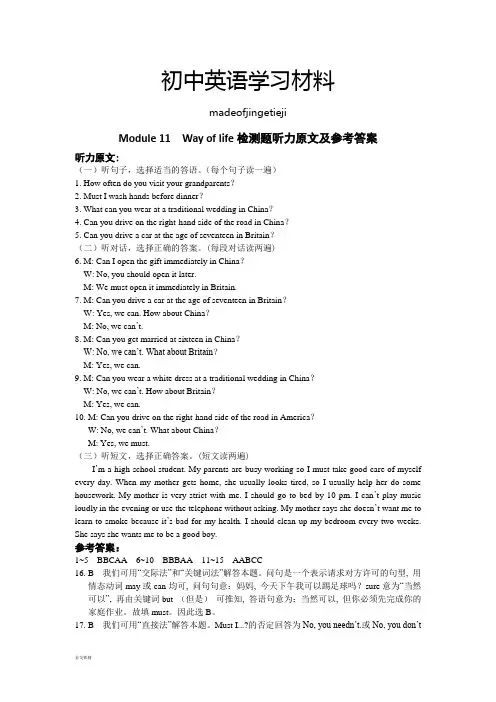
初中英语学习材料madeofjingetiejiModule 11 Way of life检测题听力原文及参考答案听力原文:(一)听句子,选择适当的答语。
(每个句子读一遍)1. How often do you visit your grandparents?2. Must I wash hands before dinner?3. What can you wear at a traditional wedding in China?4. Can you drive on the right-hand side of the road in China?5. Can you drive a car at the age of seventeen in Britain?(二)听对话,选择正确的答案。
(每段对话读两遍)6. M: Can I open the gift immediately in China?W: No, you should open it later.M: We must open it immediately in Britain.7. M: Can you drive a car at the age of seventeen in Britain?W: Yes, we can. How about China?M: No, we can’t.8. M: Can you get married at sixteen in China?W: No, we can’t. What about Britain?M: Yes, we can.9. M: Can you wear a white dress at a traditional wedding in China?W: No, we can’t. How about Britain?M: Yes, we can.10. M: Can you drive on the right-hand side of the road in America?W: No, we can’t. What about China?M: Yes, we must.(三)听短文,选择正确答案。
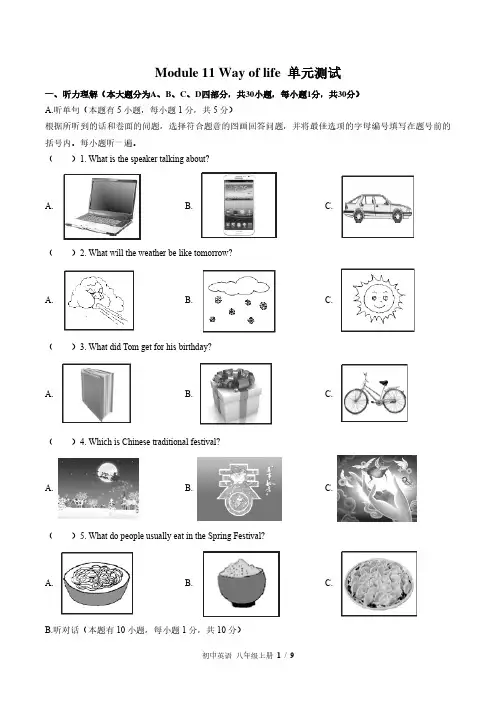
Module 11 Way of life 单元测试一、听力理解(本大题分为A、B、C、D四部分,共30小题,每小题1分,共30分)A.听单句(本题有5小题,每小题1分,共5分)根据所听到的话和卷面的问题,选择符合题意的图画回答问题,并将最佳选项的字母编号填写在题号前的括号内。
每小题听一遍。
()1. What is the speaker talking about?A. B. C.()2. What will the weather be like tomorrow?A. B. C.()3. What did Tom get for his birthday?A. B. C.()4. Which is Chinese traditional festival?A. B. C.()5. What do people usually eat in the Spring Festival?A. B. C.B.听对话(本题有10小题,每小题1分,共10分)根据所听内容,回答每段对话后面的问题,在每小题所给的三个选项中选出一个最佳答案,并将其字母编号填写在题号前的括号内。
每段对话听两遍。
听第一段对话,回答第6小题。
()6. Is it bad manners or good manners to open the present right now in China?A. Bad manners.B. Good manners.C. Both are OK.听第二段对话,回答第7小题。
()7. How many children are there under the tree?A. Three.B. Four.C. Seven.听第三段对话,回答第8小题。
()8. What must the student wear in school?A. Jacket.B. New shoes.C. School uniforms.听第四段对话,回答第9小题。
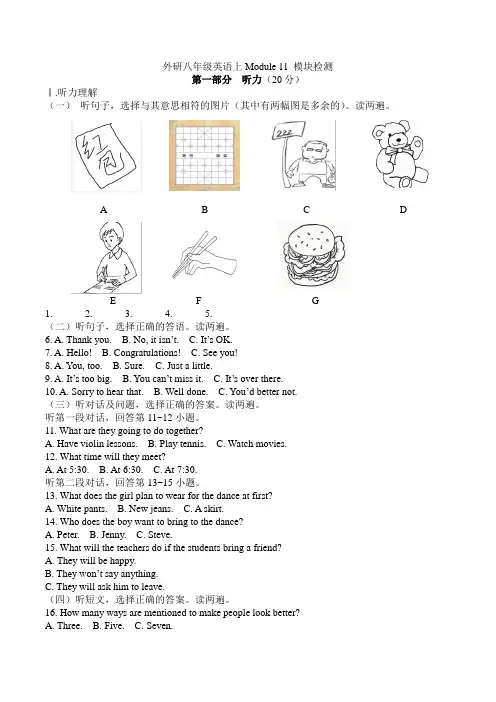
外研八年级英语上Module 11 模块检测第一部分听力(20分)Ⅰ.听力理解(一)听句子,选择与其意思相符的图片(其中有两幅图是多余的)。
读两遍。
A B C DE F G1.______2.______3.______4.______5.______(二)听句子,选择正确的答语。
读两遍。
6. A. Thank you. B. No, it isn’t. C. It’s OK.7. A. Hello! B. Congratulations! C. See you!8. A. You, too. B. Sure. C. Just a little.9. A. It’s too big. B. You can’t miss it. C. It’s over there.10. A. Sorry to hear that. B. Well done. C. You’d better not.(三)听对话及问题,选择正确的答案。
读两遍。
听第一段对话,回答第11~12小题。
11. What are they going to do together?A. Have violin lessons.B. Play tennis.C. Watch movies.12. What time will they meet?A. At 5:30.B. At 6:30.C. At 7:30.听第二段对话,回答第13~15小题。
13. What does the girl plan to wear for the dance at first?A. White pants.B. New jeans.C. A skirt.14. Who does the boy want to bring to the dance?A. Peter.B. Jenny.C. Steve.15. What will the teachers do if the students bring a friend?A. They will be happy.B. They won’t say anything.C. They will ask him to leave.(四)听短文,选择正确的答案。
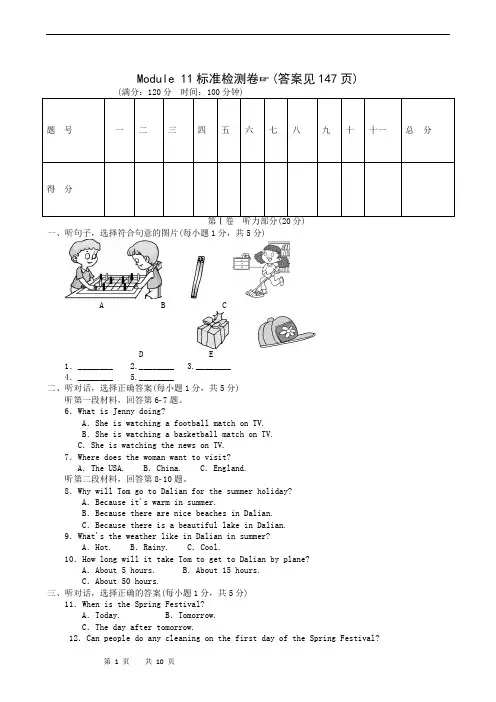
Module 11标准检测卷☞(答案见147页)题号一二三四五六七八九十十一总分得分一、听句子,选择符合句意的图片(每小题1分,共5分)A B CD E1.________ 2.________ 3.________4.________ 5.________二、听对话,选择正确答案(每小题1分,共5分)听第一段材料,回答第67题。
6.What is Jenny doing?A.She is watching a football match on TV.B.She is watching a basketball match on TV.C.She is watching the news on TV.7.Where does the woman want to visit?A.The USA. B.China. C.England.听第二段材料,回答第810题。
8.Why will Tom go to Dalian for the summer holiday?A.Because it's warm in summer.B.Because there are nice beaches in Dalian.C.Because there is a beautiful lake in Dalian.9.What's the weather like in Dalian in summer?A.Hot. B.Rainy. C.Cool.10.How long will it take Tom to get to Dalian by plane?A.About 5 hours. B.About 15 hours.C.About 50 hours.三、听对话,选择正确的答案(每小题1分,共5分)11.When is the Spring Festival?A.Today. B.Tomorrow.C.The day after tomorrow.12.Can people do any cleaning on the first day of the Spring Festival?A.Yes,they can. B.No,they can't.C.No,they needn't.13.Why can't people break anything?A.Because it's too expensive.B.Because it means bad luck.C.Because it means good luck.14.What does Mary like very much?A.Dumplings. B.Papercuts.C.Lanterns.15.What kind of special things can people go to see?A.Lanterns. B.Papercuts.C.The Dragon and Lion Dance.四、听短文,判断正(T)误(F)(每小题1分,共5分)16.The MidAutumn Day is one of the most important traditional festivals in China.() 17.The most popular food on the MidAutumn Day is dumplings.()18.Each family will have the members get together to have a big dinner on that day.( ) 19.On that night,the moon is the brightest.( )20.Some old people would like to tell the children a story about the dragon.( )第Ⅱ卷笔试部分(100分)五、单项选择(每小题1分,共15分)21.—Can you play ________ violin?—No,but I am good at playing ________ chess.A.the;the B./;/ C./;the D.the;/22.—Mike, you can't wrap hongbao ________ black paper.—Oh, sorry.A.for B.in C.at D.by23. This kind of peach looks really nice,but it ________ very sour.A.tastes B.looks C.feels D.sounds24.—Must I practice the violin now,mom?—No, you ________.You can go out for a walk.A.mustn't B.shouldn't C.can't D.needn't25.When he heard the good news,he told it at__once to all his friends.(同义替换) A.happily B.excitedlyC.proudly D.immediately26.You look tired.You'd better ________ a good rest.A.stop to have B.stop havingC.to stop to have D.to stop having27.They usually shake hands with the people they meet ________.A.on time B.in timeC.all the time D.for the first time28.Don't be afraid of new words.You can ________ in the dictionary.A.look up them B.look after themC.look them up D.look over them29.The English teacher is ________ a teacher ________ a very good friend of ours.A.not just; and B.not just; orC.not just; but D.not just; /30.—________ you come to my party on Sunday?—Sorry, I'm not available.I ________ study for the math test.A.Can; must B.Must; canC.Need; may D.May; can31.Noise,________,is a kind of pollution.A.example B.for exampleC.such D.such as32. Your application won't ________ until you complete the survey.A.accept B.receiveC.be accepted D.be received33. ________ interesting TV program Running Man is! I watch it every week.A.How B.WhatC.What a D.What an34.—I'd like a pet,but I am busy all day.—Goldfish are a good choice.You ________ feed them everyday.A.mustn't B.can't C.shouldn't D.needn't35.—Can I give my Chinese friend a clock as the present?—________A.You're welcome. B.Get a move on!C.I'm sorry to hear that. D.No,you mustn't.六、完形填空(每小题1分,共10分) (词数:约230;建议用时:7分钟)In most cultures,when you meet people you know for the first time,it is usual to greet them.Once a young woman ________(36) England went to Hong Kong to work.When she first arrived,she ________(37) little about the Chinese culture of language.On her way to school,one day,she went to a ________(38) to get some money.To her surprise,the bank clerk asked her ________(39) she had had her lunch.She was surprised at such a question because in the British culture it would ________(40)an invitation to lunch.Between unmarried young people it can also mean the young man's ________(41) in dating the girl.Since this bank clerk was a stranger to the British woman,she was very puzzled and quickly answered that she had eaten already.________(42) this she went on to school and was even more surprised when one of the teachers asked her the same question.By now she understood that it could not be an invitation ________(43) was puzzled why they asked it.In the following days,she was asked the same question again and again and she spent many hours ________(44) to work out why so many people kept asking this.At last she thought that these people must be concerned about(关心) her health.She was rather ________(45) at that time and she thought they must be worrying that she was not eating well.36.A.on B.at C.from37.A.knew B.spoke C.liked38.A.school B.bank C.home39.A.if B.how C.when40.A.give B.mean C.make41.A.interest B.hobby C.idea42.A.When B.Before C.After43.A.but B.and C.or44. A.tried B.try C.trying45.A.fat B.ugly C.thin七、阅读理解(每小题2分,共30分)A (词数:约160;建议用时:5分钟)Family traditions are special habits or customs that your family have.For example, in the family of Bill Gates, his parents keep the tradition of reading with children.And what's theA.playing B.readingC.singing D.traveling47.________bought a film ticket for his mother.A.Bill B.JackC.Nick D.Yu Xin48.Sometimes, Jack's parents ________when the family get together.A.cook foodB.talk about interesting thingsC.meet cousinsD.play games with the children49.Yu Xin has visited some places EXCEPT ________.A.Xiamen B.HangzhouC.Beijing D.Qingdao50.The three children are talking about their________.A.school life B.birthday partiesC.birthday plans D.family traditionsB (词数:约150;建议用时:5分钟)Everyone has birthday.Ways of celebrating birthday are different.In America, parents have a party for their birthday kid.The birthday kid can get lots of presents and eat birthday cake with friends.In Brazil, special candles are needed for birthday.In England, the birthday kid is lifted up and put down by his classmates happily.In Thailand,two tall candles are lighted the night before birthday.As we all known, it is getting popular to have cake on birthday in China.But parents usually cook a big dinner for the kid on birthday.The birthday kid eats long noodles or eggs.Long noodles mean long life and eggs bring good luck.People in different countries have different ways to celebrate birthday.It is important for us to celebrate birthday.Everyone grows one year older after his or her birthday.Relatives (亲人) and friends feel happy for his or her growing up.51.How many countries are mentioned (提到) in the passage?A.Four. B.Five. C.Six.52.In ________,special candles are needed for birthday.A.Brazil B.America C.England53.Chinese parents usually cook ________ for the birthday kid.A.long noodles or eggsB.long noodles or chickenC.chicken or eggs54.In Thailand, two tall candles are lighted the night ________.A.on birthday B.before birthdayC.after birthday55.One will ________ after he celebrates his birthday.A.grow one year older B.grow upC.become cleverC (词数:约270;建议用时:8分钟)Different countries have different customs.When you are in different countries, you shouldfollow their customs.In China, it's impolite to talk when eating dinner.And you're not supposed to start eating first if there are older people at the table.Very often people who travel to the United States forget to tip(付小费).It is usual to tip waiters, taxi drivers and porters who help carry your bags.Waiters expect to get a 15% tip on the cost of your meal.Taxi drivers expect about the same amount.In England, make sure to stand in line even if there are only two of you.It's important to respect (尊重) lines there.It's a good idea to talk about the weather.It's a favorite subject of conversation with the British.In Spain (西班牙), it's a good idea to have a light meal in the afternoon if someone invites you for dinner.People have dinner very late, and restaurants do not generally open until after 9:00 pm.In Saudi Arabia (沙特阿拉伯), men kiss one another on the cheek (脸颊).Your host may welcome you with a kiss on both cheeks.It is polite for you to do the same.In Japan, people usually give personal or business cards to each other when they meet for the first time.When a person gives you a card, don't put it into your pocket (口袋) as soon as you get it.The person expects you to read it.Don't forget to be careful of your body language to express something in conversations.A kind of body language that is acceptable in one culture may be impolite in another.56.How many countries are mentioned in this passage?A.Four. B.Five. C.Six. D.Seven.57.What does the underlined word “porters” mean in Chinese?A.搬运工B.水电工C.建筑工D.环卫工58.If you travel to the US, you spend $ 200 on a taxi ride and $320 on a meal, you are supposed to tip ________ in total.A.$520 B.$78C.$156 D.$6059.Which of the following is True?A.You are expected to kiss your host on the cheek in Japan.B.Generally, restaurants don't offer dinner after 9:00 pm in Spain.C.It's impolite to eat first if there are older people at the table in China.D.You don't need to stand in line if there are two people waiting for a bus in England.60.What does the passage mainly talk about?A.Where to travel.B.How to tip in different countries.C.When to use body language.D.Customs in different countries.八、任务型阅读(每小题2分,共10分)(模拟·合肥)(词数:约170;建议用时:7分钟)Weddings (婚礼) are important in every country, and there are different wedding customs in different countries.In Western countries,the bride's (新娘的) dress—her wedding dress—is very important.Some brides wear a new dress. ________(61)Some people believe the bride should wear something old, something new, something borrowed and something blue.________(62)She may borrow something to wear from a friend—that will be something borrowed, and the ring on her finger may have a blue jewel in it or some of her clothes may be blue.________(63)They wear the ring on the fourth finger of their left hands.At the wedding, their friends often throw rice or very small pieces of paper over the bride and the groom(新郎).________(64)The bride often carries flowers, and after the wedding she throws them up in the air.People believe that the woman who catches the flowers is lucky enough.The bride,the groom, their friends and family then have a party.After that the bride and the groom go on holiday together.This holiday is called “the honeymoon”.从方框中选择适当的选项补全短文,并回答第65题。
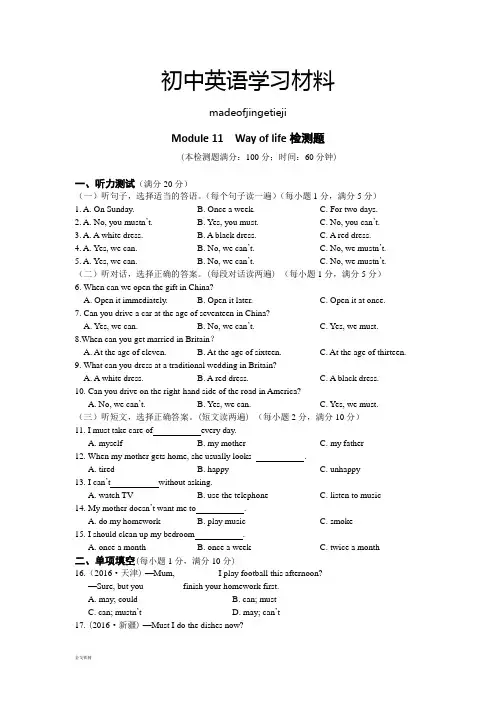
初中英语学习材料madeofjingetiejiModule 11 Way of life检测题(本检测题满分:100分;时间:60分钟)一、听力测试(满分20分)(一)听句子,选择适当的答语。
(每个句子读一遍)(每小题1分,满分5分)1. A. On Sunday. B. Once a week. C. For two days.2. A. No, you mustn’t. B. Yes, you must. C. No, you can’t.3. A. A white dress. B. A black dress. C. A red dress.4. A. Yes, we can. B. No, we can’t. C. No, we mustn’t.5. A. Yes, we can. B. No, we can’t. C. No, we mustn’t. (二)听对话,选择正确的答案。
(每段对话读两遍)(每小题1分,满分5分)6. When can we open the gift in China?A. Open it immediately.B. Open it later.C. Open it at once.7. Can you drive a car at the age of seventeen in China?A. Yes, we can.B. No, we can’t.C. Yes, we must.8.When can you get married in Britain?A. At the age of eleven.B. At the age of sixteen.C. At the age of thirteen.9. What can you dress at a traditional wedding in Britain?A. A white dress.B. A red dress.C. A black dress.10. Can you drive on the right-hand side of the road in America?A. No, we can’t.B. Yes, we can.C. Yes, we must.(三)听短文,选择正确答案。
外研版八年级英语上册Module 11 Way of life单元测试题Ⅰ.单项填空(每小题1分,共15分)( )1.He turned round as he heard someone ________ his name.A.calling B.to callC.called D.is calling( )2.—Mrs Wang was sent to teach English in a poor mountain village last year.—She said she would never forget some pleasant ________ while working there.A.experiments B.expressionsC.experiences D.emotions( )3.I saw a gentleman ________ a young man ________the shoulder and smile politely.A.touch; on B.touch; ofC.touched; on D.touched; of( )4.Mr Li is ________ a teacher ________ a very good friend of ours.A.not; also B.not only; butC.only; but D.only; also( )5.It is polite ________ the seat to old people on the bus.A.offer B.offeringC.to offer D.offered( )6.This dictionary ________ Tom's. It has Ann's name on it.A.might be B.may beC.can't be D.must be( )7.—I don't know the new words.—It doesn't matter. You can ________ in the dictionary.A.look up them B.look them upC.look them for D.looked them up( )8.—I'd like to choose yellow as the colour of our bedroom.—________. The colour brings me a warm and comfortable feeling.A.No way B.Sounds greatC.In your dreams D.I can't decide( )9.—You bought the car about ten years ago?—Yes.________ it's old, it still runs well.A.Because B.SinceC.Although D.But( )10.It's not polite to cut in line when you ________ a bus at the bus stop. A.ask for B.wait forC.care for D.look for( )11.You look very tired.You'd better ________.A.stop to work B.stop workingC.to stop to work D.to stop work( )12.There are a lot of trees on ________ sides of the road.A.each B.two C.both D.all( )13.Tom didn't go to school ________ this morning because he overslept. A.at once B.on timeC.by accident D.at present( )14.—Must I return the book tomorrow morning?—No, you ________. You can keep it longer.A.mustn't B.can'tC.needn't D.couldn't( )15.This is just between you and me. You ________ tell others about this.A.may not B.mustn'tC.needn't D.couldn'tⅡ.完形填空(每小题2分,共20分)People all over the world celebrate the New Year. However, not all countries celebrate in the same way, and in some countries, the New Year doesn't begin on the__16__ date every year.In many countries, the New Year begins on 1st January, but people start celebrating on 31st December, New Year's Eve. In New York many people go to celebrate in Times Square.__17__they're waiting for the New Year, they listen to music, sing traditional songs and have fun. Just before 12 o'clock, everyone__18__ down from 10: 10, 9, 8… As soon as it's 12 o'clock, everyone shouts very__19__,“Happy New Year!”New Year's Day is often a family day. Some families get together for a special meal. When the weather is fine, many families go out for a __20__.On New Year's Day, many people make resolutions for the new year. They __21__ a list of things, such as “I will help out more with housework.”“I will work __22__ at school than others.”or “I won't spend so much time playing video games.” When they have made __23__ list, they read it to their family or friends and promise to __24__ their resolutions.So it doesn't matter how they celebrate; __25__people in countries all over the world, it's a time to say goodbye to the old year, and to welcome the new.( )16. A.familiar B.sameC.important D.normal( )17.A.If B.Even thoughC.While D.Before( )es B.turnsC.looks D.counts( )19.A.loudly B.quietlyC.sadly D.safely( )20.A.walk B.secretC.job D.treatment( )21.A.put on B.write downC.take away D.look after( )22.A.quickly B.hardC.harder D.hardly( )23.A.its B.his C.her D.their( )24.A.follow B.makeC.do D.give( )25.A.by B.forC.with D.fromⅢ.阅读理解(每小题2分,共20分)ADifferent countries have different customs. When you travel to other countries, please follow their customs, just as the saying goes,“________.”Very often people who travel to the United States forget to tip. It is usual to tip porters_who help carry your bags,taxi drivers and waiters. Waiters expect to get a 15%tip on the cost of your meal. Taxi drivers expect about the same amount.In England, make sure to stand in line even if there are only two of you. It's important to respect lines there. It's a good idea to talk about the weather. It's a favourite subject of conversation with the British.In Spain, it's a good idea to have a light meal in the afternoon if someone invites you for dinner. People have dinner very late, and restaurants do not generally open until after 9 pm.In Arab countries, men kiss one another on the cheek. Your host may welcome you with a kiss on both cheeks. It is polite for you to do the same.In Japan, people usually give personal or business cards to each other when they meet for the first time. When a person gives you a card, don't put it into your pocket right away. The person expects you to read it.Don't forget to be careful of your body language to express something in conversation.A kind of body language that is acceptable in one culture may be impolite in another.( )26.When you travel to the US, you don't need to tip ________.A.porters B.waitersC.teachers D.taxi drivers( )27.The missing sentence in the first paragraph should be “________”.A.Love me, love my dogB.He who laughs last laughs bestC.When in Rome, do as the Romans doD.Where there is a will, there is a way( )28.The underlined word“porters”in the passage means “________” in Chinese.A.搬运工 B.清洁工C.接线员 D.售票员( )29.Which of the following is TRUE according to the passage?A.In Spain, people usually have dinner very early.B.In England, it's not polite to talk about the weather.C.In Arab countries, men kiss one another on the cheek.D.In Japan, you should not read the business card as soon as you get it.( )30.What's the best title of the passage?A.How to TipB.Body LanguageC.When to Have DinnerD.Advice to International TravellersBFor the British, the home is a private place in which he or she goes to hide away from the troubles of life. It is very seldom that one would be invited to a British person's home. It is rude to knock on a person's door if you are not invited. If you are invited, don't ask to see more than the downstairs that your British host invites youinto. Never ask how much the house or any of the items in it costs.To the American, most of them want their home to be a place where they can entertain(款待) and share their lives with their friends. They may be delighted to give you a full tour of their houses. They may also be pleased when you show your interest and pleasure in their houses.Both British and American people will engage_in quite a bit of chat and a drink or two before the meal is served. After the first mouthful, you should say how delicious the food is and ask something about it. Remember, never eat with your mouth open and make very little noise while eating. It would be nice of you to help your host in any way. Maybe offer to pour some drinks or clear up after the meal.( )31.British people ________ invite friends to their home.A.often B.alwaysC.seldom D.never( )32.If your British friend invites you to his home, you can ________.A.see anything you likeB.ask how much his house isC.ask the cost of any of the items in itD.only see the downstairs that you are invited into( )33.When you show your interest and pleasure in American people's house, they may be ________.A.angry B.happyC.sad D.worried( )34.What does the underlined phrase “engage in” mean in Chinese?A.陷入 B.参与 C.回避 D.限制( )35.What's the main idea of the passage?A.Some manners on visiting British and American people's home.B.Different table manners between British and American people.C.Different ideas about the home between British and American people.D.Different ideas about how to get along well with neighbours between British and American people.Ⅳ.根据汉语意思完成句子(每小题2分,共10分)36.在中国,你必须用双手接礼物。
Module11 Way of life一、单项选择1. --- I go out with my friends, Mom?--- No, you can't. You must do your homework first.A. MustB. Have toC. DoD. Can2. --- Can I go fishing with you, Dad?--- I'm sorry you . You must stay at home and do your homework.A. won'tB. can'tC. don'tD. aren't3. --- Dad, can I go to the movies tonight?--- Sure, but you come back home before 9 o'clock.A. canB. mustC. mayD. might4. You are allowed to play football in the yard, but you break anything.A. might notB. needn'tC. may notD. mustn't5. You eat the soup if you don't like it.A. shouldn'tB. mustn'tC. needn'tD. can't6. --- Shall we meet at the station at 8 am?--- In fact we . The train until 10 am.A. mustn't; doesn't leaveB. mustn't; leavesC. needn't; won't leaveD. needn't; will leave7. My mother is a traveler with , and she has some interesting .A. experience; experiencesB. experience; experienceC. experiences; experienceD. experiences; experiences8. --- Would you please see the film Iron Man 3 with me tonight, Kate?--- I'd love to, but I've Linda's invitation to dinner.A. sufferedB. earnedC. receivedD. accepted9. --- Our English teacher is very in class.--- Yes, but she usually plays games with us after class.A. outgoingB. athleticC. seriousD. wild10. Teenagers have all kinds of dreams. , some students would like to go to the moon some day.A. After allB. At onceC. In factD. For example11. We can eat in the cafe. But we eat in the classroom.A. canB. didn'tC. can'tD. aren't12. --- we clean the classroom at once?--- No, you . You clean it after school.A. Must; needn't; canB. Need; mustn't; mayC. Must; mustn't; canD. Shall; can't; may13. --- May I take the magazine out of the reading room?--- No, you can't. You read it here. It's the rule.A. mustB. wouldC. mayD. might14. You smoke. You are only 14 and it isn't allowed.A. mustn'tB. don't have toC. needn'tD. won't15. You return the book now. You can keep it until next week if you like.A. have toB. can'tC. mustn'tD. needn't二、单词拼写(单句首字母填空)16. In the USA, when you get a present, you must open it i .17. They are twins, but they have many d .18. Respecting the old and loving the young is a Chinese t .19. She has an excellent t in clothes, art and music.20. When you a a present, you must use both hands.21. My mother phoned me just now. I must go home i .22. Although they are twins, there are many d between them.23. It's a t in China to give presents at Spring Festival.24. I don't like eating lemon. It t too sour.25. The old man gave Mary some money, but she didn't a .三、单词拼写(根据中文提示拼写单词)26. To our (惊奇), the boy has changed so greatly.27. There are many (不同) between living in a city and living in the country.28. He is good at teaching and has much teaching (经验).29. When you (接受) a present, you must use both hands. It's a traditional custom in China.30. Celebrating the Spring Festival is an old (传统习俗) for Chinese people.31. Her face was (严肃的) as she told us the bad news.32. Father is making chicken (三明治) for us.33. Now many foreigners have learnt to use (筷子) during their stay in China.34. Our company has trips to suit all kinds of (品味).35. Too much work has been placed on his (肩膀).四、翻译(根据中文提示完成句子)36. --- 我必须现在就做家庭作业吗?--- 不,不必了。
2019-2020年八年级英语(上)(外研衔接版)Module11Wayoflife检测题(本检测题满分:100分;时间:60分钟)一、听力测试(满分20分)(一)听句子,选择适当的答语。
(每个句子读一遍)(每小题1分,满分5分)1. A. On Sunday. B. Once a week. C. For two days.2. A. No, you mustn’t. B. Yes, you must. C. No, you can’t.3. A. A white dress. B. A black dress. C. A red dress.4. A. Yes, we can. B. No, we can’t. C. No, we mustn’t.5. A. Yes, we can. B. No, we can’t. C. No, we mustn’t.(二)听对话,选择正确的答案。
(每段对话读两遍)(每小题1分,满分5分)6. When can we open the gift in China?A. Open it immediately.B. Open it later.C. Open it at once.7. Can you drive a car at the age of seventeen in China?A. Yes, we can.B. No, we can’t.C. Yes, we must.8.When can you get married in Britain?A. At the age of eleven.B. At the age of sixteen.C. At the age of thirteen.9. What can you dress at a traditional wedding in Britain?A. A white dress.B. A red dress.C. A black dress.10. Can you drive on the right-hand side of the road in America?A. No, we can’t.B. Yes, we can.C. Yes, we must.(三)听短文,选择正确答案。
MODULE 11 Way of life检测题(本测试题满分:100分;时间:60分钟)一、听力测试(满分20分)(一)听句子,选择适当的答语。
(每个句子读一遍)(每小题1分,满分5分)1. A. On Sunday. B. Once a week. C. For two days.2. A. No, you mustn’t. B. Yes, you must. C. No, you can’t.3. A. A white dress. B. A black dress. C. A red dress.4. A. Yes, we can. B. No, we can’t. C. No, we mustn’t.5. A. Yes, we can. B. No, we can’t. C. No, we mustn’t.(二)听对话,选择正确的答案。
(每段对话读两遍)(每小题1分,满分5分)6.When can we open the gift in China?A. Open it immediately.B. Open it later.C. Open it at once.7. Can you drive a car at the age of seventeen in China?A. Yes, we can.B. No, we can’t.C. Yes, we must.8.When can you get married in Britain?A. At the age of eleven.B. At the age of sixteen.C. At the age of thirteen.9. What can you dress at a traditional wedding in Britain?A. A white dress.B. A red dress.C. A black dress.10. Can you drive on the right-hand side of the road in America?A. No, we can’t.B. Yes, we can.C. Yes, we must.(三)听短文,选择正确的答案。
八年级英语上册:Module 11 综合能力测试听力部分 (25分)一、听句子,选择图片。
(5分)听力材料:1.Daming wants to buy a dictionary.2.Don't cut your hair on the Spring Festival.3.My father went to a wedding party last Friday.4.Chinese people usually shake hands when they meet for the first time. 5.My mother bought a sandwich for me yesterday.( A )1.A.B.C.( C )2.A. B. C.( B )3.A. B. C.( A )4.A. B. C.( C )5.A. B. C.二、听句子,选答语。
(5分)听力材料:What present does Tom get on his birthday?( A )6.A.A computer. B.A birthday party. C.He is thirteen.听力材料:When is Chinese New Year?( A )7.A.January 1st. B.December 25th. C.October 1st.听力材料:Which color is lucky in China?( B )8.A.Yellow. B.Red. C.Green.听力材料:What should you eat on the Spring Festival?( A )9.A.Dumplings. B.Cakes. C.Noodles.听力材料:Where do people in England have their wedding party?( C )10.A.In their home. B.In the hotel. C.In the church.三、听对话及问题,选答案。
Module 11 Way of lifeⅠ.单项填空(20分)1.I don't think Alice fits(适合)the job, because she has little ________.A.success B.differenceC.discussion D.experience2.—What do you think of this book?—It's boring. There's ________ in it.A.nothing interestingB.anything interestingC.everything interestingD.something interesting3.—Does the soup________ nice?—Yes. It's hot, but really delicious.A.sound B.feelC.look D.taste4.—May I put my bike here?—No, you________.You should put it over there.A.couldn't B.needn'tC.mustn't D.won't5.—Does he need ________ there at once?—No, he ________ leave so hurriedly because he has enough time.A.to go; doesn't needB.go; needn'tC.to go; needn'tD.go; doesn't need6. Be quick! The game will begin ________.A. immediatelyB. recentlyC. carefullyD. luckily7.You'd better ________ late for school again.A.not to be B.not beC.won't be D.don't be8.What ________ news it is! Nobody ________ it.A.a surprising; believesB.surprising; believesC.a surprised; believeD.surprised; believe9.—Has Lucy ________ my invitation?—Yes, she has. But she can't ________ it because she will have to look after her grandpa that day.A.received; receive B.accepted; acceptC.received; accept D.accepted; receive10.—It's said that there will be a storm tomorrow.—________. I planned to go climbing with my classmates.A.I hope so B.I'm afraid soC.Sounds good D.Bad luckⅡ.完形填空(20分)Manners are important to keep good relations (关系) among people. __11__ likes a person with bad manners. A person with __12__ manners never __13__ people when they are __14__ trouble. Instead, he tries to help them. When he asks for something, he says “Please”. And when he __15__ others' help, he usually says “Thank you”. He does not interrupt(打扰) others when they are talking. He does not __16__ loudlyin public. When he __17__, he uses a handkerchief(手绢). __18__ a student, it is bad manners to come late for class. __19__ you are late, you should say __20__ to the teacher.11.A.Some one B.No one C.Any one D.One12.A.sad B.certain C.bad D.good13.A.smiles at B.laughs at C.looks at D.says to14.A.on B.from C.in D.as15.A.takes B.looks C.sees D.gets16.A.talk B.tell C.jump D.think17.A.sneezes B.smokes C.drinks D.eats18.A.And B.So C.With D.For19.A.Because B.If C.Although D.Then20.A.sorry B.thank you C.OK D.not at allⅢ.阅读理解(15分)Different countries have different customs in giving presents.IN CHINA you must never give a clock to a Chinese person, because the sound of the word for “clock” is similar to the sound for “death” in Chinese. Also, don't wrap(包裹) a present in white, black, or blue paper, because these are the colours for funerals(葬礼). Don't give a knife, because something sharp(锋的) can cut a friendship.IN RUSSIA if we give flowers as a present, we have to give odd numbers of them (one, three, five, etc.) because even numbers of flowers (two, four, six, etc.) are for funerals.IN GERMANY flowers are a good present to take to your dinner hostess, but don't take her red roses because it means you are in love with her. Don't take thirteen of anything because it's an unlucky number. Don't take an even number of anything, either. Don't wrap your present in white, brown, or black paper.21.Why can't we give a clock as a present to a Chinese? Because in Chinese ________.A.the word “clock” h as the same meaning with the word “death”B.the word “clock” has the same sound with the word “death”C.the word “clock” has the same meaning with the word “knife”D.the word “clock” means “dangerous”22.You may take ________ if you go to a birthday party in Russia or in Germany. A.10 flowers B.13 flowersC.9 flowers D.11 red roses23.________ thirteen is an unlucky number.A.In China B.In RussiaC.In Japan D.In Germany24.What's the Chinese meanings for “odd number” and “even number”?A.自然数和偶数B.基本数和奇数C.奇数和偶数D.幸运数字和不幸运数字25.Which of the following is TRUE?A.Neither Chinese nor Germans wrap presents in black or white paper. B.Both Chinese and Russians wrap presents in black or white paper. C.Both Chinese and Germans wrap presents in black or white paper. D.Neither Chinese nor Russians wrap presents in black or yellow paper. Ⅳ.补全对话(10分)(Vicky and Zheng Na are chatting by QQ.)V: This summer holiday my family will go to Beijing for a trip.Z: That sounds great!V: 26.________Z: No. It's different from your country. People should drive on the right.V: Do people always shake hands when they meet?Z: No. When you meet someone for the first time, you should shake hands.27.________V: OK. And what do people use for meals?Z: Chopsticks.V: 28.________Z: No, you needn't eat up the food on the plate.V: 29.________Z: The host often makes tea for the guests.V: I see. 30.________Z: You're welcome.Ⅴ. 根据汉语意思完成句子(10分)31.我们应该更多地关注传统文化。
Module 11 测试限时:60分钟满分:100分一、单项选择(每小题1分,共10分)1.—Can you play ________ violin?—No,but I am good at playing ________ chess.A.the;the B./;/ C./;the D.the;/2.This kind of peach looks really nice,but it ________ very sour.A.tastes B.looks C.feels D.sounds3.We need clean air and water, so we ________ protect the environment.A.can B.may C.must D.might 4.When he heard the good news,he told it at once to all his friends. (同义替换) A.happily B.excitedlyC.proudly D.immediately5.He has much ________ as an engineer. So he can build the bridge successfully.A.balance B.experienceC.surface D.service6.—Don't ________ too late; you will feel tired in class.—I won't, Mum.A.call up B.wake upC.stay up D.get up7.He noticed a man ________ on the bus just now.A.to get B.getsC.to getting D.get8.Last summer vacation, I went to Shanghai ________ the first time.A.for B.at C.in D.on9.The poor boy ________ a lot of money, but he didn't ________ it.A.received; receive B.accepted; acceptC.received; accept D.accepted; receive10.—Look!________ is dancing under the tree.—Oh, that's my cousin, Anna.A.Everybody B.AnybodyC.Nobody D.Somebody二、完形填空(每小题2分,共30分)I'm enjoying my stay in Canada. It is my first experience of being abroad, and I am trying to learn as ________11 as possible. Classes here are much more fun and very different from classes in ________12. In China there are very few opportunities to practice ________13 and listening, so although many Chinese students are good at ________14, their speaking is not good. Studying English at Fern is much more practical. We actually ________15 the language we are learning. I couldn't speak any English at all when I ________16 here. Thankfully after about a month, things started getting ________17 and I made friends and started to settle in(安家). I am really ________18 to learn English here and Fern is a very good language school.I have always wanted to have a sister. In my Canadian host family my dream has ________19. On the first day when I arrived, my host family welcomed ________20 warmly. All the family members were ________21 and helpful, and they made me feel at home at once.My ________22, Joise, is very kind. She often explains their manners to me. Her mother explains ordinary things like housework. Together they ________23 me study and understand Canada. Joise told me a ________24. Last year, she met a Chinese student on a plane. She said she felt sorry because she did not say ________25 to the girl.I'm happy to live in Canada. I think it will be an important experience in my life.11.A. many B.much C.good D.better12.A. Japan B.Canada C.China D.America 13.A. playing B.reading C.writing D.speaking 14.A. grammar B.writing C.English D.time15.A. write B.read C.hear D.use16.A. entered B.arrived C.arrived in D.got to17.A. harder B.freer C.busier D.easier18.A. sad B.sorry C.happy D.afraid19.A. come true B.come outC.come over D.come on20.A. him B.her C.me D.them21.A. serious B.friendly C.famous D.expensive 22.A. sister B.father C.brother D.mother 23.A. want B.tell C.help D.order24.A. book B.diary C.letter D.story25.A. everything B.anythingC.something D.nothing三、阅读理解(每小题2分,共10分)As the years go by, the Italian community has found its place in Australia. One of the main reasons is the birth of a second generation(代). The children of migrants (移民) have grown up as Australians.Lucy's family is an example. Lucy's parents came from Italy in the 1950s. Lucy was born in Sydney soon after her parents arrived in Australia. Lucy's parents were both workers. They spoke Italian at home. When Lucy went to school, she had to learn English. Her mum and dad could speak just a little English. At home it was always Italian. When she got a bit older, her mum and dad would ask her to help them out when they didn't understand something in English.When she was growing up, her parents didn't allow her to do as much as her Australian friends. Her friends didn't understand why she couldn't go out and do things with them, or why she always did what her parents wanted! Lucy's parents spent a lot of time with other Italians, mainly because it was much easier for them to communicate in Italian. Because of this, she spent more time with kids from Italian background.Things have changed since Lucy had children of her own. Lucy is not as strict as her parents were, so her own kids have more freedom(自由). They can move between the different cultures and feel easier in both cultures. They haven't had so many problems about their identities (身份). They see themselves as Australians with an Italian background and they're proud of their traditions. 26.Lucy's family live in ________.A.Italy B.Germany C.Australia D.China 27.Lucy's parents spoke ________ at home most of the time.A.English B.Italian C.Chinese D.German 28.When Lucy was a kid, she was allowed to ________.A.do what her parents wantedB.do everything with her friendsC.do as much as her Australian friendsD.spend more time with kids from Australian background29.Lucy's children ________.A.only speak ItalianB.can't accept Australian culturesC.don't like their own Italian traditionsD.live in Italian and Australian cultures freely30.What's the main idea of the passage?A.Lucy's parents lived a hard life in the early years.B.It's hard for Lucy's children to accept Australian culture.C.As time goes by, the Italians in Australia have found their places there.D.The Italians have played an important role in Australian society.四、任务型阅读(每小题2分,共10分)British school kids enjoy qigongThe third European Health Qigong Games were held in London in late August. At the opening ceremony(仪式),14 children from England's Fibbersley Park Academy performed qigong with about 300 adults. The children, aged 6 to 11, practiced qigong for one year.The children's qigong teacher is Nicola Day. She introduced(推介)qigong into Fibbersley Park Academy a year ago. Soon she started __①__(teach) it once a week in the school. She says qigong is good for children's health and she hopes more students will learn qigong.②Rheeya, 11, said that she was lucky to join the qigong club at school. Now she likes practicing it at home every day.根据短文内容完成下列各项任务。